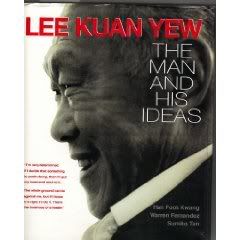Population control revisited
 30 years later, the same man who was responsible for the “Stop At Two” policy in the 70s, is now telling us that the government “accept only immigrants who increase the average level of competence of Singaporeans” – and doing so to the tune of 1.68 million foreigners presently on our tiny island, in a population of 3.2 million Singaporeans.
30 years later, the same man who was responsible for the “Stop At Two” policy in the 70s, is now telling us that the government “accept only immigrants who increase the average level of competence of Singaporeans” – and doing so to the tune of 1.68 million foreigners presently on our tiny island, in a population of 3.2 million Singaporeans.
This is in response to Singapore’s birth rate problem – it continues to fall, despite government incentives to induce Singaporeans to have children.
Besides MM Lee’s dubious record in population control, the same danger of our Parliamentarians silently tagging along and thus giving support to such policies, as similarly happened in the 70s and 80s, may see history repeat itself – 30 years hence, with future generations living the consequences of this present policy.
Calls from some quarters for the government to re-look its policy on foreigners have been met with dismissive remarks by government ministers. “Just zeroing in on foreign workers alone is not the total solution,” Manpower Minister Gan Kim Yong said in August. He also termed such calls “simplistic”.
What concerns Singaporeans are not just jobs or economic prosperity but also the social consequences of having so many foreigners in our midst. This has led to some Singaporeans wondering if the government knows what is happening on the ground, where physical and personal space is now harder to come by, even in the heartlands. This may potentially result in social friction among the various groups, something which the Prime Minister spoke about in his National Day message recently.
The government’s preoccupation seems to be the economy and how foreigners can contribute to this. It has said little about the social consequences, although it has set up the National Integration Council “to drive social integration efforts across the private, people and public sectors”. The success of the council’s effort is left to be seen.
In the meantime, the government has been urging Singaporeans to “embrace and accept” these foreigners, as MM Lee said on 14 August. He also urged Singaporeans to “treat new citizens as equals”. (AsiaOne)
According to the New Population Secretariat website, the number of PRs in 2008 was 79,167, upped from 63,627 the previous year.
The number of new citizens hit a record high of 20,513 in 2008, upped from 17,334 in 2007.
We seem to be in a hurry to bring in foreigners at an alarming rate.
But perhaps all is not lost. The lone voice in Parliament calling for a re-look of the policy has come from the ruling party’s own Member of Parliament, Mrs Josephine Teo. But even so, she is only concerned about the falling productivity level of Singaporean workers. Her argument is that a more targeted approach to the employment of foreigners will help up the productivity level of Singaporeans.
But given how the government seems to feel that the policy is the right one, and ministers have defended it to the hilt, it does not appear that any changes will be forthcoming.
The man and his ideas are not always right
 Lee Kuan Yew’s attempt at population control in the 70s and 80s has resulted in a population unable and unwilling to replace itself.
Lee Kuan Yew’s attempt at population control in the 70s and 80s has resulted in a population unable and unwilling to replace itself.
Will our current policy at population control by the same government result in a worse fate for Singaporeans in the future?
Blogger Lucky Tan says it best here:
The real reason for the large percentage of imported labor, more than almost anywhere else in the world, is to keep wages down so that rent, utilities, transport and other costs can go up. It would have been alright if we did it like Dubai where the indigenous population sits on top of the economic food chain while foreigners do all the work. The problem is a large number of Singaporeans are at the bottom of the food chain….crushed.
Anyone who’s had a track record in population control as Lee Kuan Yew has would be seen as a failure. Yet, we are providing front page coverage to MM Lee’s latest thinking on the topic.
MM Lee may have been instrumental in building Singapore.
But neither he nor his government is always right – as history has proved.
http://sgblogs.com/entry/what-will-tonight/357513


 In the 70s, then-Prime Minister Lee Kuan Yew introduced the “Stop-At-Two” policy to curb our population growth. The buzzwords then were “Family Planning” and “Two Is Enough”. For those who are unfamiliar with the policy, this was what it entailed, according to
In the 70s, then-Prime Minister Lee Kuan Yew introduced the “Stop-At-Two” policy to curb our population growth. The buzzwords then were “Family Planning” and “Two Is Enough”. For those who are unfamiliar with the policy, this was what it entailed, according to  30 years later, the same man who was responsible for the “Stop At Two” policy in the 70s, is now telling us that the government “accept only immigrants who increase the average level of competence of Singaporeans” – and doing so to the tune of 1.68 million foreigners presently on our tiny island, in a population of 3.2 million Singaporeans.
30 years later, the same man who was responsible for the “Stop At Two” policy in the 70s, is now telling us that the government “accept only immigrants who increase the average level of competence of Singaporeans” – and doing so to the tune of 1.68 million foreigners presently on our tiny island, in a population of 3.2 million Singaporeans. Lee Kuan Yew’s attempt at population control in the 70s and 80s has resulted in a population unable and unwilling to replace itself.
Lee Kuan Yew’s attempt at population control in the 70s and 80s has resulted in a population unable and unwilling to replace itself.